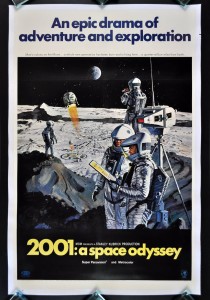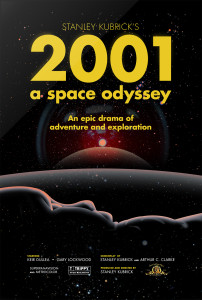I will not, for one hot second, pretend that I can explain to you what 2001: A Space Odyssey means. Starting with what I can say without question, it is a science fiction film with, at times, some of the best physical effects ever committed to film. Stanley Kubrick’s 1968 feature took filmgoers someplace that they could hardly imagine when they walked into the theater.
The film is a meditative masterpiece bookended on either side by thirty minutes with no dialogue. Kubrick, from the outset, decides that he is completely in charge of the next one hundred and sixty-one minutes of your life.
I do not wish to be disparaging when I say that most of the effects were landmarks. Technologically Kubrick could not have created better effects for the apes in the beginning of the film and their performances are excellent, but the costumes pale in comparison with the quality of the models of the Discovery One and the special effects of the actors in space. While there are a few questionable effects, they are surrounded by spectacular ones. 2001: A Space Odyssey set the gold standard for space effects that few have come close to matching with physical effects.
It would be interesting to watch the film with the score isolated from the dialogue. The amount of meditation that a viewer can find while watching is, in a sense, interrupted when you have to stop to listen to characters speaking. It seems that the story can be moved along well enough with a fraction of the words.
I mention the meditative quality of the film. It is very easy to get lost thinking about your own ills while watching the education of HAL, wishing for a moment when you may have enough power to really have a tangible level of control over your life’s outcomes. I am not suggesting that the actions that HAL took had any virtue, but the computer let self-preservation take over, and there is something poetic in that thought.
A fear of artificial intelligence is that once a computer can understand how useless we humans are when compared to the computers’ intellect, we become an expendable burden on the computers, something in the way of their future. I cannot help but assume this is something that Kubrick was thinking with Isaac Asimov when they wrote the film. The search for man will only lead to the search for man. It is a cyclical quest that we continue to trek even though we already have the solution, regardless of whether or not we choose to accept it.
Important Links
BFI Top 50: 2001: A Space Odyssey
Wikipedia: 2001: A Space Odyssey

